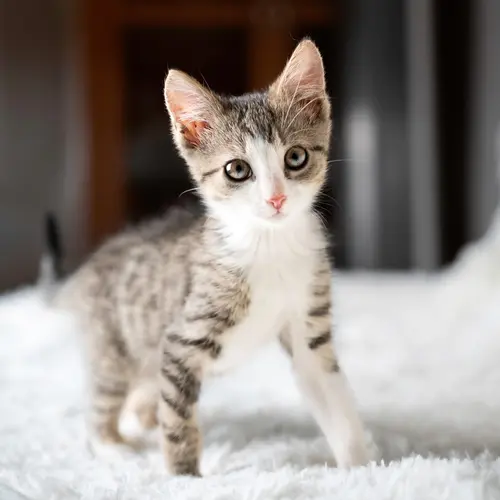People love to pamper their pets, lavishing them with treats and affection.
Although you can probably never give too much affection, cat treats are another thing. Cats can develop weight problems just like people do. According to a study reported by the Association for Pet Obesity Prevention, an estimated 57% of cats are overweight or obese.
Can cat treats ever be good for kitty? Are some treats better than others? And is “people food” healthy for your cat? Here are answers and tips from cat experts.
What Makes a Cat Treat Healthy?
Moderation is key, experts tell WebMD.
It's fine to feed your cat treats, but they “should be a very small part of the diet," says Marla J. McGeorge, DVM, an Oregon vet who treats felines only.
How small? Many experts recommend cat treats make up no more than 10% of the total calories a cat eats.
That’s because most treats don’t add anything but calories to a cat’s diet, McGeorge says.
The remaining 90% of your cat’s calories should come from a high-quality, nutritionally complete cat food.
Cat Treats: Decoding the Labels
Learning what’s in packaged cat treats can be a bit of a puzzle.
“Information provided on labels could use a lot of improvement,” McGeorge tells WebMD. That’s because not all nutrients are listed on cat food labels, and there’s usually no calorie count offered, either.
To learn how many calories are in your cat’s treats, you can contact the pet food manufacturer or check with your vet for recommendations.
At a minimum, McGeorge suggests looking at labels to see if a treat is approved by the Association of American Feed Control Officials (AAFCO). This group sets pet food manufacturing standards, “minimal as they are," McGeorge says.
10 Treat Tips for a Healthy Cat
- Remember moderation. Like people, cats can develop a taste for treats, and they may decide to avoid their own food in favor of the goodies they love. For this reason, keep cat treats novel by offering them no more than two or three times a week, says Susan G. Wynn, DVM, CVA, a veterinary nutritionist in Georgia.
- Go easy with “people food.” Foods made for cats are formulated to contain the vitamins, minerals, and amino acids a cat needs for good health, so “people food” should be a minimal part of your cat’s diet. For an occasional delicacy, you might try small bits of cheese or cooked tuna, chicken, fish, or liver. You can also give your cat a tablespoon of milk now and again, but for cats that are lactose intolerant, this may cause diarrhea, Wynn says.
- Avoid toxic foods. Raisins, grapes, onions, alcohol, salt, tea -- we may love them, but these and other common foods can be toxic to cats. If you’re not sure a treat is safe, talk your vet before giving it to your kitty.
- Ban begging. When giving your cat a treat, avoid doing it at the dinner table or at the cat’s insistence. Don’t reward begging.
- Overweight cats need care. There’s no way around it: Cat treats add calories. But simply cutting out treats isn’t going to do much for an overweight cat, McGeorge says. She recommends having your cat evaluated by a vet, who will develop a safe diet plan to help your cat lose weight “slowly and carefully. Rapid weight loss in an overweight cat can lead to a serious liver disease called hepatic lipidosis.”
- Go green.Catnip makes a fine cat treat, Wynn tells WebMD -- and it’s low-calorie. Most cats love both catnip and "cat grass," which is actually a cereal grass like wheat or oats. Both treats are easy to grow in a sunny window, and you can also find dried and fresh greens in pet stores. Always be sure the plant you’re offering your cat is safe for felines. But don’t be alarmed if your cat regurgitates the kitty grass you buy -- some just do that. Stick with catnip for those cats, McGeorge suggests. If you’re not sure a plant is cat-safe, check the ASPCA’s web site for information on plants toxic to felines. If you think your cat may have eaten a dangerous plant call your vet immediately, or contact the Animal Poison Control Center at(888-426-4435.
- Give cat treats for fun and fitness. Help your cat exercise brain and body by using cat treats to train them in agility exercises or tricks. This can be even more enjoyable for indoor-only cats.
- Apologize with cat treats. Try giving cat treats after something kitty doesn’t like -- such as claw trimming, tooth brushing, or a dose of medication. Along with praise and petting, this can go a long way toward soothing a feline who’s been forced to do something unpleasant
- Don’t use cat treats to replace love. Cats don’t have many needs: a healthy diet, safe home, loving attention. When you’re short on time, it can be easy to think a handful of treats builds the same bond as a stroke or cuddle, but “I’m not sure it really works that way,” says Anthony Herrig, an Oregon engineer with four contented felines. “My cats are no more lovable for having had a treat. I think it’s physical contact like playing, petting, and holding that helps a cat bond with you.”
- Make your own natural cat treats. By cooking up small bits of liver, fish, or eggs for your cat, you’ll know exactly what’s in the treats they are eating. You can even make organic cat treats for kitty by buying meat, fish, and eggs that are certified organic. But remember, these treats should make up only a small part of your cat's overall diet.


